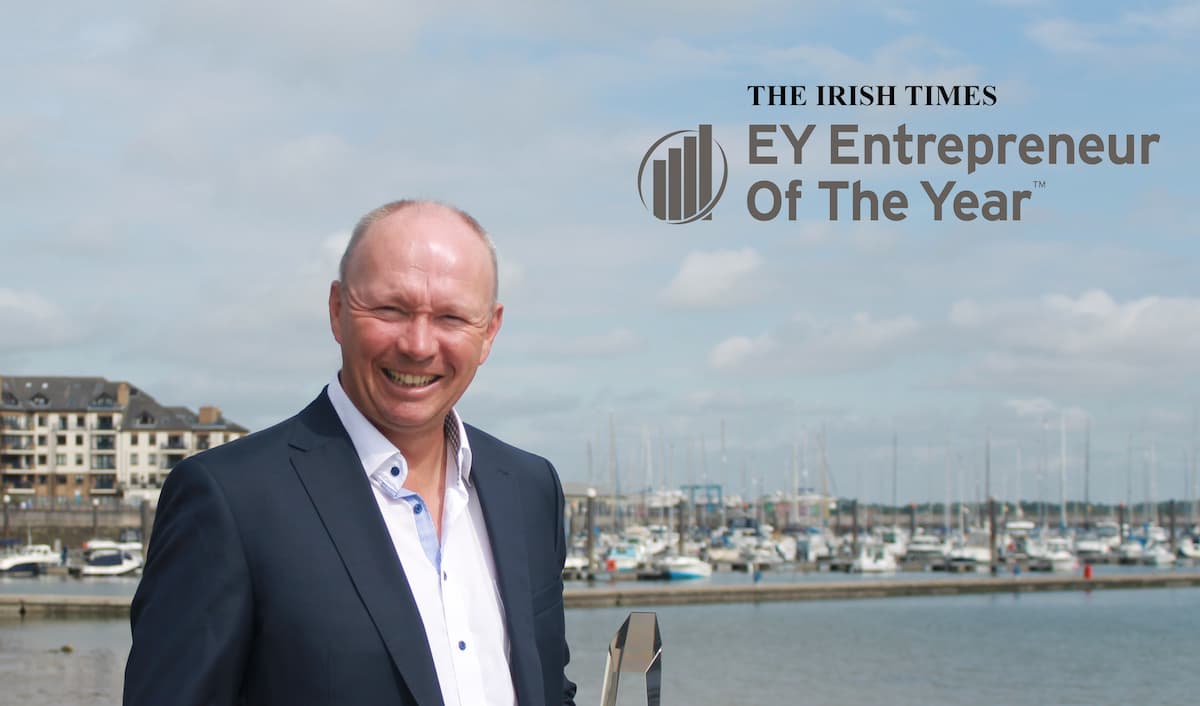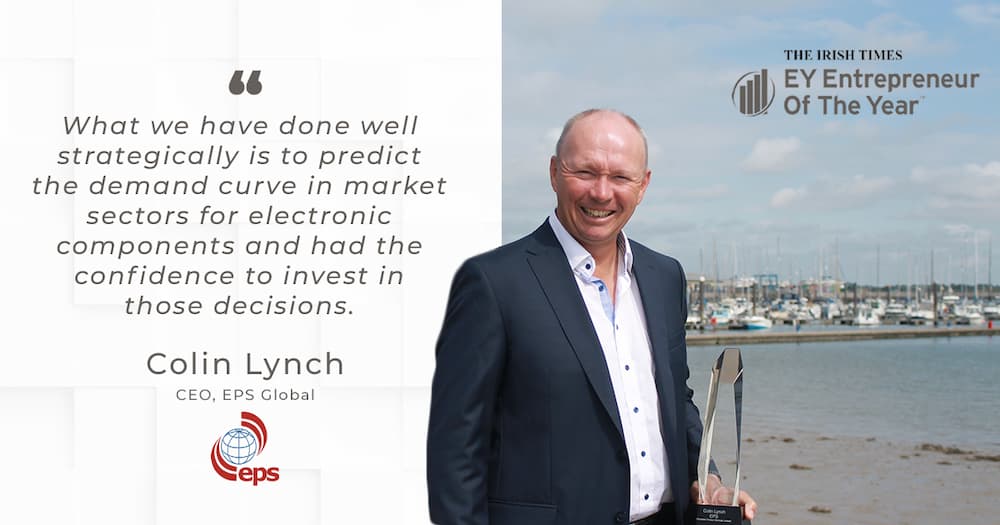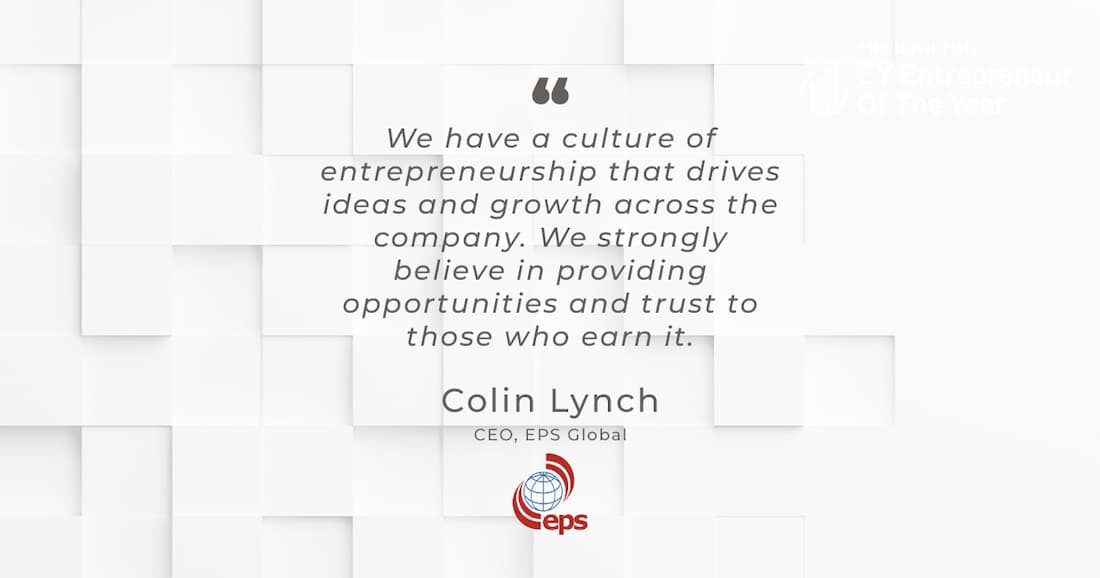This week, EPS's CEO Colin Lynch, a nominee in the International category of the EY Entrepreneur of the Year competition, was profiled in The Irish Times newspaper. The awards are run in association with Julius Baer, Enterprise Ireland, Invest NI, The Irish Times and Newstalk and are currently in their 24th year.

Colin Lynch graduated from Trinity College Dublin with a degree in electronic engineering and subsequently completed a Master of Business Administration in University College Dublin. He then set off into a career in the electronics industry but soon felt he would never realise his potential in the large multinational in which he was working.
As a result, he co-founded EPS with three others and has spent most of his time at the company seeking growth as its business development director. Two years ago, he took up the role of chief executive. A believer in first mover advantage, Lynch saw opportunity in the Covid-19 pandemic. When competitors had to close factories in Wuhan owing to the virus Lynch identified a client that need certain stock. He then placed a $12million (€10million) order for stock that successfully shipped to that client.
Today, EPS has two divisions, its services division which manufactures from 24 service centres worldwide and its networking technology division which provides solutions to data centres to drive cost effectiveness. By 2025 Lynch anticipates that the company will reach annual sales of $300 million (€255.2 million), making the company about three times its present size.
What is your greatest business achievement to date?
I am hesitant to say what my greatest business achievement is because, although I am so proud of what my colleagues and I have achieved so far, I believe that the best is yet to come.
What was your “back-to-the-wall” moment and how did you overcome it?
Unsurprisingly, cash flow during global economic downturns. The year 2008 stands out. That was the time I stayed up all night with my wife, Louise, going over figures again and again, and we jointly decided to remortgage our family home and reduce our income from the business by 40 per cent to keep it running. All our senior team had enough belief in our future to do the same. It is an enduring source of pride for all of us and our families that those fraught decisions and sacrifices have paid off.
What moment/deal would you cite as the “game changer” or turning point for the company?
Our growth has been driven by a series of small, incremental wins – there has been no single tipping point deal or one moment that changed the paradigm. What we have done well strategically is to predict the demand curve in market sectors for electronic components and had the confidence to invest in those decisions. For instance, our early focus on the growth of electronics in the automotive and data centre sectors has been fully vindicated.

What are the big disruptive forces in your industry?
The electronic component market is in a state of perpetual disruption and presently there are three big forces at play. The cost of freight has increased substantially over the last couple of years and this could drive the big American and European customers to locally source low value, high margin products. Secondly a trend towards economic nationalism is disrupting long embedded supply chains. Finally, there is a significant capacity problem in semiconductor and passive component supply. There aren’t enough factories (fabs) in the world to meet demand accruing from the increase in electronics in cars and also in devices needed to facilitate remote working, so lead times are badly out of balance.
What are you doing to disrupt, innovate and improve the products or services you offer?
In distribution and services, today’s high margin differentiated offering is always becoming tomorrow’s low margin commodity. You have to innovate constantly. Finding the balance between entrepreneurial innovation and meeting targets is the key to success. We focus on two discrete time horizons – three years and ten years, and always challenge ourselves with the hardest questions in business: What do we do next? What do we need to change? How do we avoid complacency? Our current obsession, given the disruptive forces discussed above, is how do we provide customers with more security in our services business.
What makes your company a good place to work?
Critical to our culture, and I personally believe this to be fundamental to our success and growth, is local empowerment. We employ 360 people worldwide and our ex-pat count is zero. We hire the best people we can at our locations, and give them the support they need to succeed. As a company we strongly believe in providing opportunities and trust to those who earn it.
We have a culture of entrepreneurship that drives ideas and growth across the company. We really embrace the differences in approach to business from different countries and cultures and allow our team members to contribute to their own success.

How has Covid impacted your business? How do you expect things to unfold?
Covid has impacted us directly, especially in places like the US, Brazil and India. Several of our team have lost family to the disease and a number have been quite ill but thankfully all recovered.
At a purely commercial level, our networking business has ramped dramatically. We’re in a time of unprecedented remote working and learning, not to mention online shopping and content streaming and people need access to high-quality broadband. Our open networking solutions help our customers, for example Internet Services Providers, deliver the broadband connectivity their customers demand.
What is the one piece of advice you would give to Government to stimulate the economy?
I am very far from being an economist, but firmly believe that the best time to fix a leaky roof is when the sun is shining. Money is cheap and will remain so for an extended period. I think we should grab as much of it as possible and stimulate activities that will garnish domestic growth. The current threat to our corporate tax advantage suggests a substitution of industrial policy focus from FDI to domestic economy is inevitable. If I look out a generation my happy place is an Ireland awash with energetic start-ups, populated by talented entrepreneurs, operating comfortably in a supportive ecosystem of universities, government, firms and civic society.
What were the best and worst pieces of advice you received when starting out?
We were once chasing a franchise with a supplier who urged us to upgrade our premises at great expense. We’ve never sent mixed cost signals like that to our team because our value is in what we deliver to customers, not the elegance of where we deliver it from.
The best advice? I was once about to invest a lot of time and money into a market that did not offer us a concrete sales pipeline. I was lucky enough to get some direct feedback from a trusted source who reminded us that we were principally “fast-followers” who didn’t have the heft to make a market. Not yet anyway.
What are the big disruptive forces in your industry?
The electronic component market is in a state of perpetual disruption and presently there are three big forces at play. The cost of freight has increased substantially over the last couple of years and this could drive the big American and European customers to locally source low-value, high-margin products. Secondly, a trend towards economic nationalism is disrupting long-embedded supply chains. Finally, there is a significant capacity problem in semiconductor and passive component supply. There aren’t enough factories in the world to meet demand accruing from the increase in electronics in cars and also in devices needed to facilitate remote working, so lead times are badly out of balance.
What is the most common mistake you see entrepreneurs make?
Without doubt – complacency. The belief that we have cracked it and nothing could possibly go wrong. Perpetual innovation at product, process and market development is the most important discipline I know. If I was asked to develop a module for an MBA programme I would call it ‘yesterday doesn’t matter.’
How will your market look in three years?
Although the chip business is notoriously cyclic, I believe the current growth in demand will sustain. The silicon capacity issue needs to be addressed and there will be huge investment in semiconductor fabs and foundries. The problem is that these are incredibly expensive decisions and it takes a long time for product to flow – so the current lead time squeeze and price pressure is a medium-term reality. I also think that supply chain nationalism will rebalance the recent dominance of China as a manufacturing location.
What is the single most important piece of advice you would offer to a less experienced entrepreneur?
I think the last couple of years have shown the world, and us at EPS Global, that we have a lot more resilience than we ever imagined. I think the less experienced entrepreneur needs to believe in this and turn it into ruthless perseverance as they follow their passion.